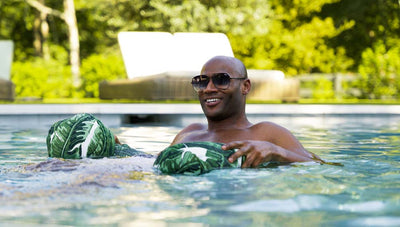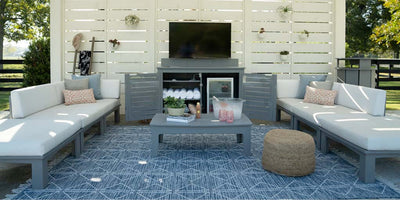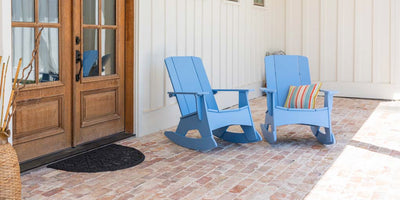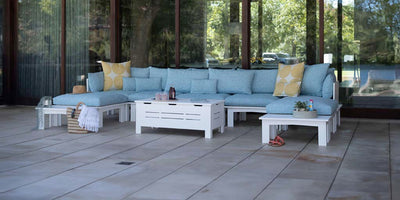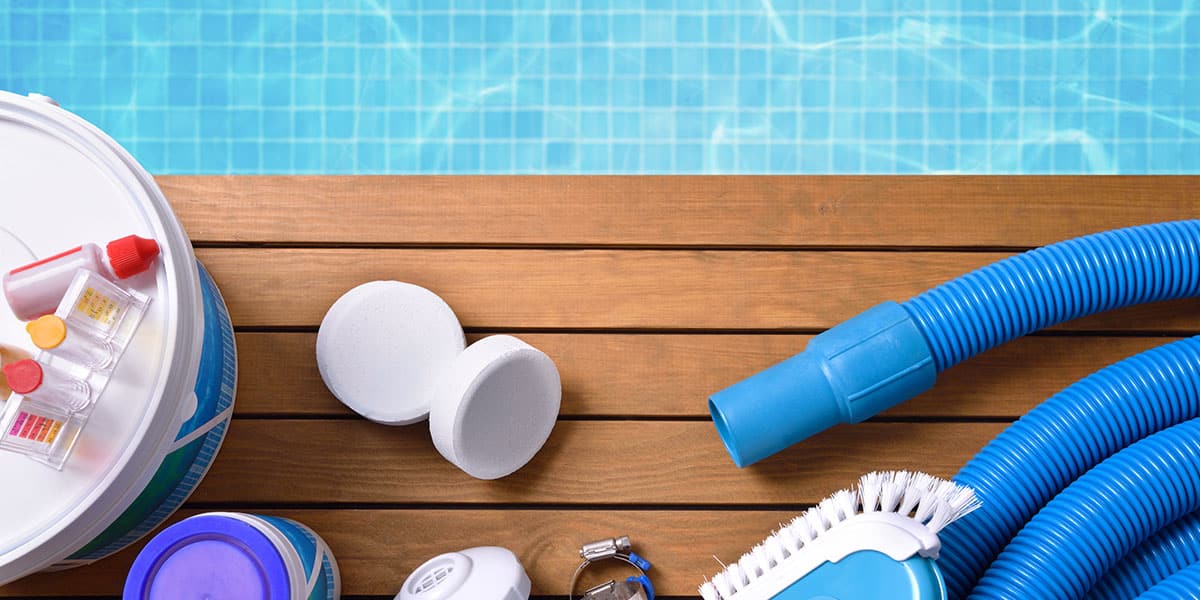Where to Store Pool Chemicals, Floats, and More for a Safe Swimming Scene
Many people look forward to spending time by the pool as the weather gets warmer. But there’s a lot more to pool ownership than the fun days of splashing and smiling. Knowing how and where to store pool chemicals, floats, and other accessories is essential to a safe swimming environment.
Creating a safe swimming scene involves more than just keeping a watchful eye on swimmers. It also means following the correct storage guidelines, which we will review in this blog.
Basic Guidelines on Where to Store Pool Chemicals Safely
A sparkling pool requires the use of chemicals. And for you and your family’s safety, it couldn’t be more important to know where to store pool chemicals so accidents can be avoided.

General Storage Considerations
Before we get into the nitty-gritty, it’s crucial to remember that safety should always be the priority. Keep all pool chemicals beyond the grasp of both children and pets. Keep them in their original containers and never transfer them to food containers. Store them away from open flames, heat sources, and direct sunlight.
Storing Pool Chemicals Indoors
Proper storage of pool chemicals is paramount when maintaining a safe and enjoyable swimming pool. So, let’s open the door to indoor storage solutions that will keep your pool area safe for everyone to enjoy.

Recommended Storage Areas: Indoor storage is ideal for pool chemicals as it provides a controlled environment. The garage, basement, or dedicated storage room are great choices. These spaces offer protection from extreme temperatures and weather conditions. Elevated temperatures can heighten the likelihood of chemical reactions or, in certain instances, even trigger spontaneous combustion.
Storage Containers and Labels: Keep chemicals in their original, tightly sealed containers. Ensure these containers are labeled correctly so you never confuse chlorine with pH increaser. A labeling system can be a lifesaver when juggling multiple pool chemicals.
Storing Pool Chemicals Outdoors
While indoor storage is often preferred for pool chemicals, it’s only sometimes feasible. We’ll explore the vital factors that will assist you in upholding the safety and effectiveness of your pool chemicals, even if you opt for the great outdoors as your storage solution.

Suitable Storage Locations: Sometimes, outdoor storage for your pool chemicals is your only option. If this is the case, choose a location that’s well-ventilated and away from direct sunlight. A shaded area beneath a sturdy awning or a pool shed can be an excellent choice for storing pool chemicals.
Weatherproof Storage Options: Invest in weather-resistant cabinets or storage bins designed for outdoor use. These will shield your chemicals from the elements, maintaining their effectiveness.
Best Practices on Where to Store Pool Chemicals
Different chemicals have different needs. Let’s explore some best practices for specific types of pool chemicals.
Chlorine-Based Chemicals
These chemicals, typically available in various forms such as chlorine tablets, granules, or liquid, effectively kill harmful bacteria, algae, and other contaminants, ensuring your pool remains a safe and inviting haven for swimmers.

Proper Storage Temperature: Keeping chlorine-based chemicals in a cool, dry environment with temperatures from 10 degrees Celsius to 21 degrees Celsius (50°F to 70°F) is recommended. Extreme temperatures can lead to a reduction in their effectiveness.
Separation from Other Chemicals: Keep chlorine-based chemicals well-separated from other pool chemicals to prevent accidental mixing, which could result in dangerous reactions.
Acidic Chemicals
These substances, like muriatic acid and dry acid, play a crucial role in adjusting and maintaining the pH levels of your pool, ensuring water comfort and equipment protection.

Safe Storage Containers: Acidic chemicals should be stored in acid-resistant containers, like plastic or glass. Avoid using metal containers, as they can corrode. Retain them within their original packaging and avoid moving them into food containers.
Avoiding Contact with Flammable Materials: Acidic chemicals can be highly reactive. Store them away from flammable materials, such as gasoline or oils, to reduce the risk of accidents.
Algaecides and Clarifiers
Algaecides, as the name suggests, combat algae growth, while clarifiers help keep your water crystal clear. These pool chemicals work quietly to maintain water quality, ensuring your pool looks inviting and remains free of common nuisances.

Temperature Considerations: Algaecides and clarifiers should be stored in a temperature-controlled environment. Extremes in temperature can impact their effectiveness.
Protecting from Sunlight Exposure: Store these chemicals in opaque containers to shield them from sunlight exposure, which can cause them to break down.
Safety Precautions and Handling Tips

Safety doesn’t stop at storage. When handling pool chemicals, follow these precautions:
Wearing Protective Gear
Make sure to have appropriate protective equipment like safety goggles or gloves when working with chemicals. It reduces the risk of accidents, protects against chemical exposure, and ensures you can safely and effectively maintain your pool without risking your health.
Proper Ventilation in Storage Areas
Be sure that every storage space, particularly indoor ones, maintains proper ventilation to avoid the accumulation of fumes.
Limiting Access to Chemicals
Keep pool chemicals out of reach of children and pets. Consider using locks or childproofing measures if necessary.
Maintenance of Storage Areas
Keeping your pool chemical storage areas well-maintained and organized is crucial for safety and efficiency. Regular cleaning and organizing ensure that spills or leaks are promptly addressed, reducing the risk of accidents.

Regularly Clean and Organize
Periodically clean and organize your storage areas. Spills or leaks can go unnoticed, leading to potentially dangerous situations.
Check Expiration Dates
Pool chemicals come with a limited shelf life. Verify the expiration dates and dispose of any expired products correctly and safely.
Spill Containment Measures
Have spill containment materials like absorbent pads or kitty litter on hand to quickly respond to chemical spills.
Storing Other Pool Paraphernalia
Now that we’ve covered chemicals let’s talk about storing your pool floats, toys, games, and other gear.

How to Store Pool Floats When Not in Use
Our pool floats are easy to store. Following use, we suggest removing the floats from the pool while draining any excess water. After drainage, you can hang the floats on a fence, chair, or rack to ensure any remaining moisture evaporates. Once thoroughly dried, you can conveniently store them in any available space, indoors or outdoors.
How to Store Wet Pool Toys
After pool playtime, rinse off toys to remove chlorine or salt, then allow them to dry thoroughly before storing them in a ventilated container. Consider removing pool toys from the water when not in use, as leaving them in the pool can lead to algae growth and water quality issues.

Storage Options
When storing your pool chemicals, floats, and toys, you have various options to suit your space and preferences. You can hang them on hooks, stack them neatly in a dedicated storage bin, or utilize a poolside storage bench. You can use a mainstay storage coffee table, bar credenza, or echo side table. These storage options provide ample functionality and ample space.
The key is keeping your products dry and protected from the elements when not used. Select a storage solution that aligns with your available space and ensures easy access for your next poolside relaxation session.
Put Safety First Around Your Swimming Pool
In pool ownership, safety should always be a top priority. Following these guidelines on where to store pool chemicals, floats, and other pool paraphernalia ensures a safe swimming scene and extends your pool equipment’s life.
Sign Up for Our Newsletter for More Tips
Pool Storage FAQ’s
Where is the safest place to store pool chemicals?
Select a storage location for your pool chemicals that avoids direct sunlight and maintains a dry and cool environment. Avoid placing the chemicals near any heat sources or in areas prone to moisture.
Is it safe to store pool chemicals together?
In the event of a spill or leakage, having dry and liquid chemicals nearby can pose a substantial risk of chemical reactions. It is imperative to position liquid chemicals on lower shelves and strictly avoid storing them above dry chemicals.
How long can you store pool chemicals?
When stored correctly, pool chemicals typically maintain their effectiveness for 3-5 years. Pool chlorine follows this pattern, although specific forms may exhibit more stability and a longer shelf life than others.






